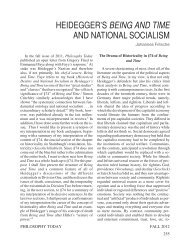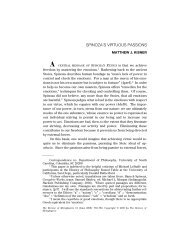Why Saying “I'm Sorry” Isn't Good Enough: The Ethics of Corporate ...
Why Saying “I'm Sorry” Isn't Good Enough: The Ethics of Corporate ...
Why Saying “I'm Sorry” Isn't Good Enough: The Ethics of Corporate ...
You also want an ePaper? Increase the reach of your titles
YUMPU automatically turns print PDFs into web optimized ePapers that Google loves.
<strong>Ethics</strong> <strong>Corporate</strong> Apologies<br />
After a ruptured Ashland Oil tank resulted in a significant oil spill affecting Pittsburgh’s<br />
drinking water supply, the firm’s CEO John Hall flew to the city, met with concerned<br />
citizens whose water supply was in danger <strong>of</strong> contamination, and took <strong>of</strong>ten hostile<br />
questions for several hours about the spill and about Ashland Oil’s planned clean-up<br />
efforts. Hall’s willingness to meet these injured individuals in their hometown testified to<br />
his desire to know exactly what was going on and to show solidarity with the victims <strong>of</strong><br />
the spill. This choice <strong>of</strong> venue reinforced his message that the company would make<br />
things right, so it is not surpassing that the apology was favorably reviewed by the local<br />
press (Associated Press, 1988).<br />
By contrast, Toyota CEO Akio Toyoda blundered when choosing the context for his<br />
apology. After discussing quality control problems with Toyota cars, the CEO left the<br />
venue in an Audi. Toyoda should have realized that choosing to exit in any car other than<br />
a Toyota would send the wrong signal. Viewers would conclude either that Toyotas were<br />
so unsafe that even the car manufacturer’s CEO did not want to drive that make <strong>of</strong> car; or<br />
that the CEO was so tone-deaf to what Toyota owners were saying about their fears that<br />
he did not think it worthwhile to choose a more appropriate venue (i.e., one that did not<br />
contractually require him to drive anything but a Toyota). In the first case, the audience<br />
will doubt the CEO’s veracity; in the second case, his practical wisdom and virtue will be<br />
called into question. Either way, the CEO’s statement will not serve to reestablish a basis<br />
for trust between the car owners and the firm.<br />
C: Audience Pathos and Genuine Apologies<br />
30

















